#north sudanese
Explore tagged Tumblr posts
Text


Wracked by guilt after covering up a murder, Mona — a northern Sudanese retired singer in a tense marriage — tries to make amends by taking in the deceased’s southern Sudanese widow, Julia, and her son, Daniel, into her home. Unable to confess her transgressions to Julia, Mona decides to leave the past behind and adjust to a new status quo, unaware that the country’s turmoil may find its way into her home and put her face to face with her sins.
Goodbye Julia (2023). Dir. Mohamed Kordofani. With Goodbye Julia, Kordofani is the first Sudanese director and film to participate in the history of the Cannes Film Festival.
53 notes
·
View notes
Text

Sudanese bride, from Sudan, by Anastasia Panjinskaya
#sudanese#sudan#africa#north africa#traditional clothing#folk clothing#traditional fashion#cultural clothing
2K notes
·
View notes
Text


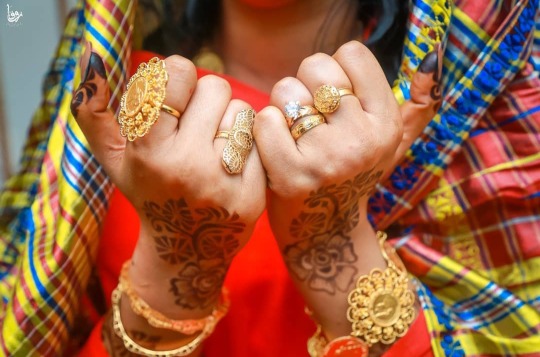
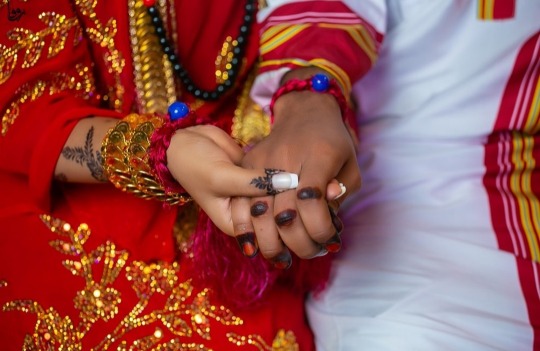
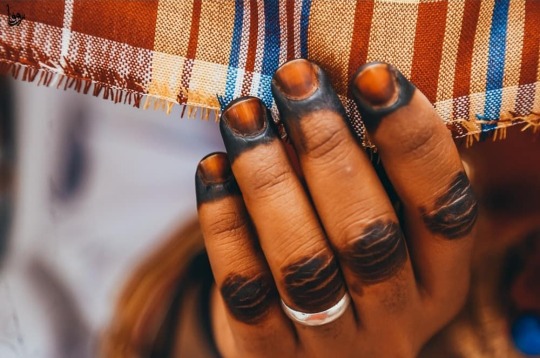

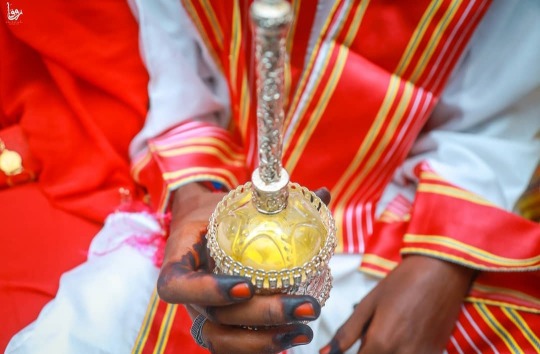
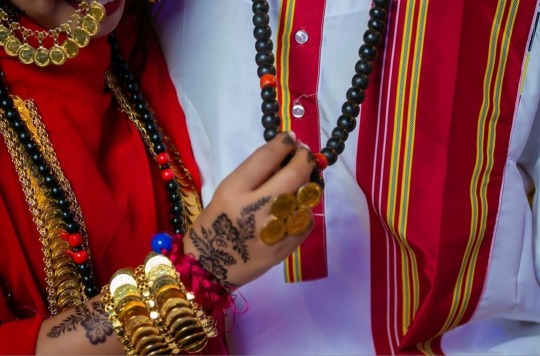
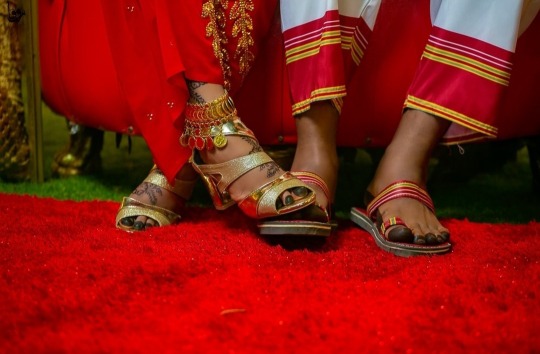
Sudanese weddings, photographed by Zofa
#zofa#ph#sudan#africa#north africa#african culture#sudanese#sudanese weddings#sudanese culture#love#couples#wedding photography#african#zofa photography
167 notes
·
View notes
Text
Jess Craig at Vox:
After more than a year of neglect from global leaders and massive funding gaps for humanitarian assistance, the war in Sudan has reached a critical tipping point. Warring parties are waging a deadly battle for control of El Fasher — the capital of the state of North Darfur and, until recently, one of the last safe havens for civilians. If the city falls, experts warn there will be dire human rights consequences, ranging from ethnic cleansing to outright genocide for millions of people.
What’s happening in El Fasher is just the latest in the year-long conflict between two rivaling military groups struggling for power after working together to oust Sudan’s former president and his successor. General Abdel Fattah al-Burhan, the general of the country’s military, known as the Sudanese Armed Forces (SAF), became the de facto ruler of Sudan in 2021 — but tensions with his temporary ally, the paramilitary group known as the Rapid Support Forces (RSF), soon boiled over as the leaders attempted to integrate the RSF into the SAF. This tension grew into a civil war last year, one that has created the world’s largest displacement crisis: On Monday, the United Nations told the AP that more than 10 million people — about a quarter of the population — have already been internally displaced since the war began. The SAF and RSF have clashed sporadically in El Fasher, which is the government military’s last foothold in all of western Sudan, but the town has largely been spared the worst of the war until recent weeks. That changed on the morning of May 10, when heavy fighting between the two groups broke out. Near daily bombings, indiscriminate shelling, and airstrikes have rocked the city since. More than 1,000 civilians have been injured and 206 people have died, according to Claire Nicolet, the emergency program manager at Médecins Sans Frontières. Hospitals and camps for internally displaced people have been damaged by gunfire and explosions. Very few aid convoys carrying food and health supplies have reached the estimated 2 million civilians in the city.
As RSF has expanded its control of other towns in Darfur over the course of the war, they have resorted to ethnic targeting and brutal violence against civilians, including raping, torturing, and killing non-Arab civilians and using racial slurs against them, as Human Rights Watch has documented. Human rights experts are concerned that if El Fasher falls to the RSF, it might trigger a new wave of ethnic cleansing, reminiscent of the genocide that occurred in Darfur in the early 2000s when some 200,000 non-Arab civilians were killed by Janjaweed militias and government forces. The RSF evolved from the Janjaweed militia, an Arab-majority fighting force created by the former president to fight Darfuris in the mid-1980s.
Although the current war between RSF and SAF is more of a power struggle than a sectarian one, ethnic tensions have long simmered in Darfur since the genocide, Akshaya Kumar, the director of crisis advocacy at Human Rights Watch, explained. If RSF gains the upper hand, they will control the entire Darfur region where most non-Arab communities reside. The situation is all too familiar. As it was in 2003, the crisis teeters on the brink of famine and genocide. And as was the case then, the world’s worst humanitarian crisis remains unconscionably neglected by the foreign governments and international bodies that have the power to intervene to push for a peaceful resolution or to urge the warring parties to respect international humanitarian law. In the coming months, the humanitarian and human rights situation in Darfur and across Sudan may be finally too harrowing to ignore, but by that point, it may be too late to do anything about it.
Vox takes a look at the vastly under-covered story of the Darfur Genocide and the battle for control of El Fasher in Sudan.
#Darfur Genocide#Darfur#Sudan#Africa#East Africa#Genocide#El Fasher#North Darfur#Sudanese Armed Forces#Rapid Support Forces#Sudan Civil War
29 notes
·
View notes
Text

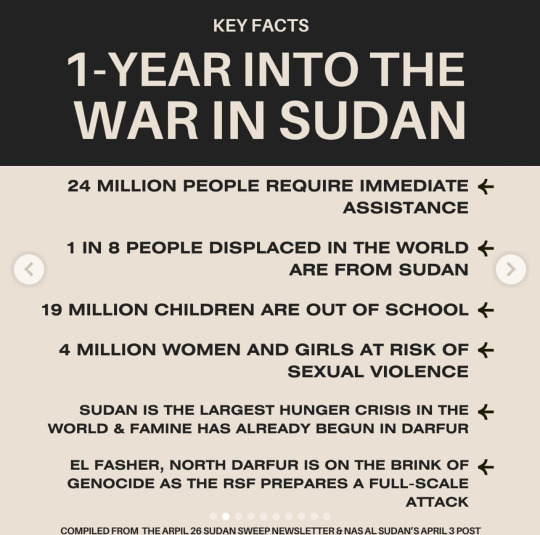









#sudan#north africa#horn of africa#Sudan war updates#sudanese culture#sudan war#action items#keep eyes on sudan
36 notes
·
View notes
Text

Young Armed Fairy
#fairycore#africa#Dakar#Senegal#Africa#document Africa#travel Africa#sudanese#sudan#north africa#folk clothing#traditional clothing#traditional fashion#cultural clothing#aesthetic#cottagecore#goblincore#soft aesthetic#light academia#naturecore#dark academia#pastel#dark cottagecore#moomin
20 notes
·
View notes
Text
Africans have more genetic variation than anyone else on Earth, according to a new study that helps narrow the location where humans first evolved, probably …
Apr 30, 2009
Africans have world's greatest genetic variation - NBC News
#african#afrakan#kemetic dreams#africans#brownskin#afrakans#brown skin#south sudan#sudanese#ta seti#north africa#northeast Africa#genetic diversity#epic video
13 notes
·
View notes
Text
im like a north african girl magnet subhanallah
7 notes
·
View notes
Text

#european council on refugees and exiles#european union#migrants#black migrants#africa#north african desert#human rights organizations#forced returns#sudanese refugees#asylum seekers#refugees#egypt#migrant abuse#sudan
4 notes
·
View notes
Text
And when the sea swallowed up the shore and the waves heaved under the ship and the blue horizon encircled us, I immediately felt an overwhelming intimacy with the sea. I knew this green, infinite giant, as though it were roving back and forth within my ribs. The whole journey I savored that feeling of being nowhere, alone, before and behind me either eternity or nothingness.
Tayeb Salih, Season of Migration to the North
2 notes
·
View notes
Text
one dumbass tweet about how white "and Black" actors are "incorrectly" cast as MENA characters and it unleashes race scientists, antiBlack Imazighen, and a guy trying to argue there's a trend where Alexander Siddig would not be cast as African today vus 20 years ago because of woke I guess
Alexander Siddig. Who has self described as Black and only has been cast as an explicitly African character a few times in his 30 year career.
#cipher talk#Give me a 10 page essay on Sudanese racial politics NEOW or shut the fuck up#'Semitic features' 'west African features' get out of my HOUSE#The reason Siddig doesn't get cast as African probably has more to do with the lack of African roles in English movies#Especially Northeast African#And the fact that Siddig is a bit picky about his roles because he doesn't want to be cast in Racist Bullshit#Than some shared guilt of Black actors for 'taking roles' from non-Black MENA actors#The problem is this tweet (probably from a whitie) has implied Black people can't be North African which has incited pogroms#In the past few years#And has acted like Black Americans have an equal guilt in taking roles from nonBlack MENA actors#Which overwhelmingly!!! It is white people that take those roles#White People. Are the guilty fucking party here#You can draw a distinction between Black MENA actors and Black actors not from the MENA sure but that's not happening here!
6 notes
·
View notes
Text
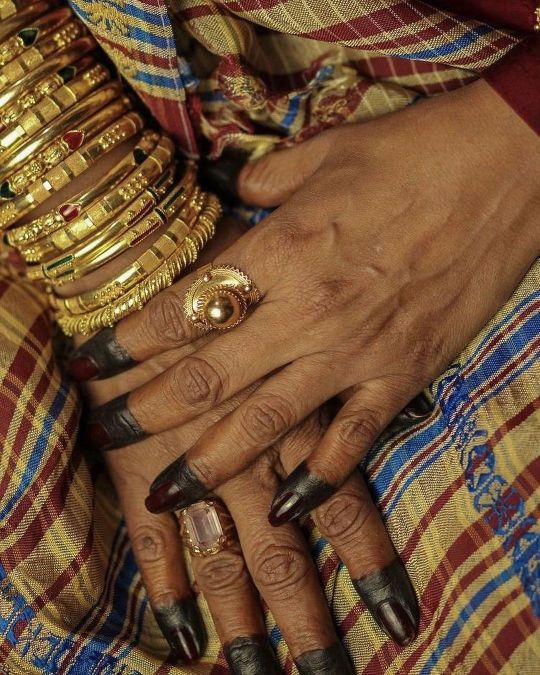
Sudanese jewelry, Sudan, by rootsbyrana
#sudanese#sudan#africa#north africa#folk clothing#traditional clothing#traditional fashion#cultural clothing
1K notes
·
View notes
Text
The Khatmiyah Mosque: A Glimpse into Sudanese Islamic Tradition
This charming old mosque, located at the base of the Taka Mountains, is the most important location for the Khatmiyah Sufi tariqa in Sudan. Mohammed Osman al Khatm created the order in the late 18th century and brought it to Sudan from Arabia. The mosque is dedicated to his son, Hassan al Mirghani, who worked tirelessly to promote the Khatmiyah’s beliefs until his death in 1869. It is thought to…

View On WordPress
#African History#East African#Khatmiyah Mosque#North Africa Architecture#Sudanese#Sudanese architecture#Sudanese History#Sudanese Islamic Tradition
1 note
·
View note
Text




monangambee is virtually screening three experimental Sudanese films on their site from June 3rd til June 9th!
Program (virtual):
Jamal, (A Camel) 1981, Ibrahim Shaddad
Insan (Human Being) 1994, Ibrahim Shaddad
Al Habil (The Rope), 1985, Ibrahim Shaddad
For more resources on supporting people in Sudan check out sudansolidaritycollective & sdn.world
#sudan#middle east#horn of africa#north africa#east africa#Sudanese cinema#monangambee#Film#cinema#african cinema
10 notes
·
View notes
Text
Re: Mikus of the World
When I see Mikus from North-North America & Western Europe: "I really like this artstyle and the references the artist has managed to sneak in. Oh, and it's really nice how different artists from the same area have different conceptions of their own culture."
When I see Mikus from the global south, indigenous cultures, and other less-frequently-seen cultures of the rest of the World: "FRHGFDSEARWTG HNBVCBNTYUIREDSCPWE THIS IS THE BEST THING EVER! I PLEDGE MY SWORD TO YOU, DEAR ARTIST! Oh look at the details in the clothing! Oh look at the beauty! I wanna see her life! I wanna be her! I wanna live in that place! THis is what the internet was made for!"
In no particular order:
palestinian miku
malaysian miku
polish miku
moroccan miku
west bengal miku
tang dynasty miku
gujarati and danish mikus
nigerian miku
belarusian miku
desi miku
afghan miku
palestinian miku
guatemalan miku
irish miku
latvian miku
bengali miku
afghan miku
italian miku
kosovo miku
black american mikus
métis miku
indian miku
nigerian miku
pakistani miku
brazilian miku
turkish miku
persian miku
cherokee miku
palestinian miku
paraguayan miku
south african miku
māori miku
brazilian miku
polish miku
taiwanese miku
south sudanese miku
welsh miku
bulgarian miku
...and many more!
Yet still not enough. Keep the Mikus coming, please.
#hatsune miku#miku hatsune#miku#vocaloid#worldwide miku#mikus of the world#vocaloid miku#culture#fanart#miku fanart#original burgers
245 notes
·
View notes
Text
The thing am want people to understand is:
The people that will see those unseriously worded and vague "stop treating motaz as your blorbo and stop canceling people for being problematic during a genocide" type posts,
and the reactions to those posts with outrage about woke people are "canceling" palestinians,
Those people seeing those posts aren't going to be the few yet loud callous "allies" making discourse that never truly supported palestinians.
Nor the people making bait trying to intentionally incite distrust in the Palestinian cause, that aren't allies but pose as ally. Or aren't even allies nor try to pretend to.
The people seeing it the most are going to be Sudanese people, and black allies to the Sudanese and Palestinians.
and whether intend to or not - those unserious worded posts and tweets, including when using same language as how u.s. conservatives and antiblack intellectuals talk about black people but in a leftist context -
Are a gateway into other posts having this obfuscated conversation with more expressly antiblack rhetoric surrounding the situation.
Serving to, in effect, steer away the conversation on Sudan and the original context. Make it about how global north people are so entitled, when black people in global south and Sudan are criticizing this. The way Sudanese aid is being redirected by Egypt, the perception of Sudanese being more "foreign" for being majorly black arab, how to boost Sudan plight - which am plan to steer this into.
But in only acknowledge the part of parasocial relations people have with Palestinian journalists where they don't take genocide seriously and are racist towards arabs in general, but not acknowledge the very common parasocial aspect where Sudanese girl criticizing Motaz would result in her getting harrassed and the proliferation of antiblackness - it shows how easy it is to fall for this stuff.
All it takes is a few people either not bothering to check the original context, or reacting to reactions. It doesn't necessarily require someone to have bad intentions nor "mean" to downplay antiblackness and the Sudanese. The effects will do the rest on social media. It is never about just 1 specific post, nor 1 specific person's intent.
Synonymizing "people criticizing Palestinians for legitimate concerns and supporting Sudanese ppl being exposed to discriminations big" with same group that "would abandon the Palestinian cause", in the people's consciousness. The conversations very premise was started wrong.
Yes, we can care about more things at once, but the framing is wrong.
Notice how some of the major Palestinian users on here are aware of this and chose not to do that for a reason.
[Note: am going to allow reblogs temporarily and then turn it off, so as to turn this into a more productive route after magz addressed these issues.]
448 notes
·
View notes